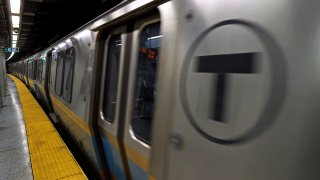
The speed restrictions that have plagued the MBTA for more than a year and a half should be gone by next month, and agency leaders will then turn their attention toward similarly important -- but less disruptive -- work on signals and station improvements.
MBTA General Manager Phil Eng said the T is on the "home stretch" of a costly year-long program that featured more than a dozen partial shutdowns of the subway system, giving workers more time to fix track defects that forced sluggish travel.
WATCH ANYTIME FOR FREE
>Stream NBC10 Boston news for free, 24/7, wherever you are. |
In September 2023, 36 miles of track across all four lines -- representing more than a third of the subway network -- had "slow zones" in place due to infrastructure problems that prevented trains from running at designed speeds, according to Eng.
Today, only seven-tenths of a mile of track still requires speed restrictions. Part of that will be lifted by the time the full Red Line reopens Monday, and the rest on the Green Line will be wiped out in December, Eng said.
Get updates on what's happening in Boston to your inbox. Sign up for our >News Headlines newsletter.
"Come Monday morning, when we reopen the Red Line, that Red Line will be [speed] restriction-free from end to end. That will be the first time probably in over 15 years," Eng told the T's Board of Directors. "We don't have any data beyond that, but most of the folks that have historical knowledge believe it was longer than that."
Riders still face occasional disruption, but Eng pointed to several statistics showing an increase in available service.
Local
In-depth news coverage of the Greater Boston Area.
Compared to the winter 2024 schedule, the winter 2025 schedule will boost weekday scheduled trips 18% on the Blue Line, 36% on the Orange Line, 53% on the Red Line and 12% on the Green Line, he said. Wait times and headways are also down on the Blue, Orange and Red Lines anywhere between 15% and 31% year over year.
Eng attributed some of the success of the past year to laying out a clear plan before the repair campaign began, which helped both crews and riders better prepare.
Commuters should expect to learn more "very soon" about similar closures planned in 2025.
"While there will be some outages needed to continue the work, it won't be to the level that we had this year," Eng said. "The public can really be able to now start to enjoy the fruits of what we've been able to put together for 2024."
Eng listed three priorities for track and infrastructure work in 2025: maintaining a state of good repair to "mak[e] sure that we do not fall backwards," signal improvements, and station accessibility.
T officials will focus much attention on accelerating work on Red and Orange Line signals, though Eng said he doesn't expect those upgrades will be complete until early 2026.
"That is really the next key piece to running reliable service, improving our ability to respond and the ability to ensure that the system can run even better than it runs today," he said.
Although he did not share ridership data Thursday, Eng said "anecdotally" that he thinks ridership is increasing on Mondays and Fridays, expressing hope that more reliable service will attract more people back to the system. Like most other transit systems, the T's ridership is stuck well below pre-pandemic levels.
The year ahead could also be a pivotal one on the financial front. MBTA officials have been warning for months that the agency faces a roughly $700 million budget gap in fiscal 2026, which begins July 1, with no more federal aid or savings to offset it.
Many onlookers expect a renewed debate about transportation financing on Beacon Hill next year, and one MBTA board member suggested Thursday that ridership data could help the agency's pitch for more money.
"We're going to be making a big case to the Legislature to fund public transit next year. Having the numbers demonstrating what the ridership has been, making the case that transit needs to be the first mode of travel, is going to be a really big part of that," said Mary Skelton Roberts, the city of Boston's representative on the oversight panel.



